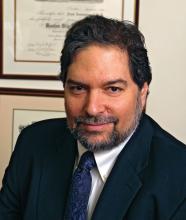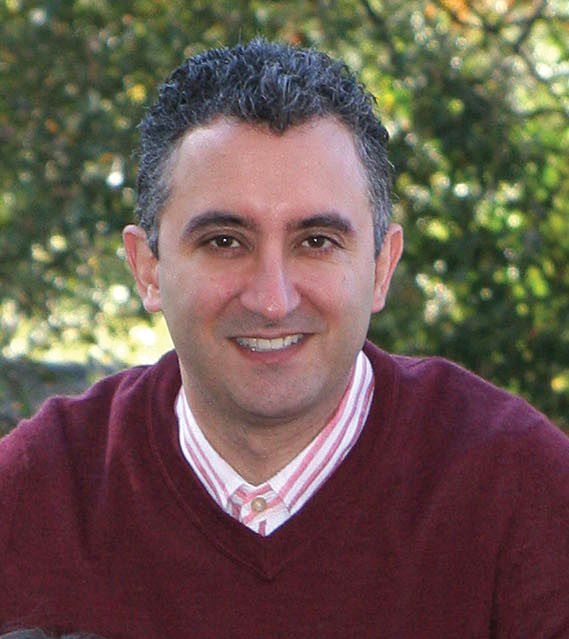User login
SAN DIEGO – Over the past year, the American Psychiatric Association has reasserted its commitment to the Goldwater Rule, yet many psychiatrists have questioned – some publicly – whether the rule needs to be revisited based on their concerns about Donald Trump’s mental fitness to be president.
[polldaddy:9767626]Both sides of the issue got a hearing during a pro and con discussion of the Goldwater Rule at the annual meeting of the American Psychiatric Association. A trio of leading psychiatrists called for the Goldwater Rule to be revised and APA past leadership defended the ethical standards of the existing rule. One past-president of the APA remarked that psychiatrists who object to the rule can choose to quit the APA, a comment that one audience member said harkened back to the Vietnam War–era rebuttal to protesters: “Love it or leave it.”
Several news stories in recent months have highlighted the Trump-spawned debate over the Goldwater Rule, which states that “it is unethical for a psychiatrist to offer a professional opinion unless he or she has conducted an examination and has been granted proper authorization for such a statement.”
The APA created the rule in 1973 after a backlash over the hundreds of U.S. psychiatrists who responded to a magazine survey by diagnosing 1964 GOP presidential candidate Barry Goldwater. He later won a libel suit against the magazine.
Prior to last year’s presidential election, the APA stood by its rule. Then, in March 2017, the APA’s Ethics Committee affirmed that “the rule applies to all professional opinions offered by psychiatrists, not just diagnoses. For example, saying an individual does not have a mental disorder would also constitute a professional opinion.”
During the pro and con discussion at the annual meeting, Paul S. Appelbaum, MD, professor of psychiatry, medicine, and law at Columbia University in New York, called the Goldwater incident “a major embarrassment for psychiatry.”
But, he added, “there are more important justifications than whether we’re embarrassed or not. Part of [the rule] is to protect persons who may be harmed by our blithe speculation to the media. We’re also interested in avoiding an impact on people who may be in need of psychiatric care but are discouraged by what they see and hear about psychiatry in the media,” he said.
“A diagnosis based on casual encounters with a person through the media is necessarily inadequate as a basis for a psychiatric diagnosis or formulation of any reliable sort,” he pointed out.
Claire Pouncey, MD, PhD, a psychiatrist who practices in Philadelphia, questioned why speaking publicly about a public figure is inherently harmful.
“How does it threaten my integrity or integrity of the profession for me to choose to speak publicly about a public figure? The APA seems to not trust its members or recognize us as moral agents who are the arbiters of our own integrity. I wish the APA would trust me,” Dr. Pouncey said.
Last year, she outlined her concerns in an article written with Jerome Kroll, MD, and published in the Journal of the American Academy of Psychiatry and the Law (June 2016;44[2]:226-35).
As for concerns about the adequacy of information, she added, “we never have complete information. And I know we don’t always have a full consent of the person being evaluated. Anyone who’s been in an emergency room knows that in their heart and soul.”
Nassir Ghaemi, MD, MPH, who chaired the session and is professor and director of the mood disorders program at Tufts University in Boston, said that strictly abiding by the Goldwater Rule is “sending out the message that the world’s psychiatrists think it’s bad to get diagnosed with a psychiatric illness. … You are not going to harm patients by talking about psychiatric illness. You help them. We know that.”
Further, Dr. Ghaemi, author of the book “A First-Rate Madness: Uncovering the Links Between Leadership and Mental Illness” (Penguin Books, 2012), argued that the “very qualities that mark those with mood disorders also make for the best leaders in times of crisis.”
President Trump’s reported traits, such as lack of sleep and talkativeness, could be portrayed as mania, he said. However, those qualities also could boost his creativity and resilience.
Jerrold M. Post, MD, a pioneer in profiling for the Central Intelligence Agency and professor of psychiatry, political psychology, and international affairs at George Washington University in Washington, D.C., said that psychiatrists have a role to play as experts, especially now. “I’m increasingly uncomfortable in not having commented on a welter of psychiatric diagnoses by people without psychiatric training,” he said. “It seems unethical to not comment at this time.”
Paul Summergrad, MD, a former APA president and chair of the department of psychiatry at Tufts, dismissed the idea that psychiatrists could mold public debate. “The assumption that we’ll somehow change opinion if we all speak out about these matters is giving us much more credit than we deserve.”
“The reality,” he said, “is that we need to wear a certain yoke of limitation and responsibility rather than thinking this is simply an issue of freedom.”
Dr. Post, Dr. Summergrad, and Dr. Pouncey reported no relevant disclosures. Dr. Ghaemi reported support (consultant/advisory board, speakers bureau, honoraria) from Sunovion. Dr. Appelbaum disclosed stock/other financial relationship with COVR.
[polldaddy:9767626]
SAN DIEGO – Over the past year, the American Psychiatric Association has reasserted its commitment to the Goldwater Rule, yet many psychiatrists have questioned – some publicly – whether the rule needs to be revisited based on their concerns about Donald Trump’s mental fitness to be president.
[polldaddy:9767626]Both sides of the issue got a hearing during a pro and con discussion of the Goldwater Rule at the annual meeting of the American Psychiatric Association. A trio of leading psychiatrists called for the Goldwater Rule to be revised and APA past leadership defended the ethical standards of the existing rule. One past-president of the APA remarked that psychiatrists who object to the rule can choose to quit the APA, a comment that one audience member said harkened back to the Vietnam War–era rebuttal to protesters: “Love it or leave it.”
Several news stories in recent months have highlighted the Trump-spawned debate over the Goldwater Rule, which states that “it is unethical for a psychiatrist to offer a professional opinion unless he or she has conducted an examination and has been granted proper authorization for such a statement.”
The APA created the rule in 1973 after a backlash over the hundreds of U.S. psychiatrists who responded to a magazine survey by diagnosing 1964 GOP presidential candidate Barry Goldwater. He later won a libel suit against the magazine.
Prior to last year’s presidential election, the APA stood by its rule. Then, in March 2017, the APA’s Ethics Committee affirmed that “the rule applies to all professional opinions offered by psychiatrists, not just diagnoses. For example, saying an individual does not have a mental disorder would also constitute a professional opinion.”
During the pro and con discussion at the annual meeting, Paul S. Appelbaum, MD, professor of psychiatry, medicine, and law at Columbia University in New York, called the Goldwater incident “a major embarrassment for psychiatry.”
But, he added, “there are more important justifications than whether we’re embarrassed or not. Part of [the rule] is to protect persons who may be harmed by our blithe speculation to the media. We’re also interested in avoiding an impact on people who may be in need of psychiatric care but are discouraged by what they see and hear about psychiatry in the media,” he said.
“A diagnosis based on casual encounters with a person through the media is necessarily inadequate as a basis for a psychiatric diagnosis or formulation of any reliable sort,” he pointed out.
Claire Pouncey, MD, PhD, a psychiatrist who practices in Philadelphia, questioned why speaking publicly about a public figure is inherently harmful.
“How does it threaten my integrity or integrity of the profession for me to choose to speak publicly about a public figure? The APA seems to not trust its members or recognize us as moral agents who are the arbiters of our own integrity. I wish the APA would trust me,” Dr. Pouncey said.
Last year, she outlined her concerns in an article written with Jerome Kroll, MD, and published in the Journal of the American Academy of Psychiatry and the Law (June 2016;44[2]:226-35).
As for concerns about the adequacy of information, she added, “we never have complete information. And I know we don’t always have a full consent of the person being evaluated. Anyone who’s been in an emergency room knows that in their heart and soul.”
Nassir Ghaemi, MD, MPH, who chaired the session and is professor and director of the mood disorders program at Tufts University in Boston, said that strictly abiding by the Goldwater Rule is “sending out the message that the world’s psychiatrists think it’s bad to get diagnosed with a psychiatric illness. … You are not going to harm patients by talking about psychiatric illness. You help them. We know that.”
Further, Dr. Ghaemi, author of the book “A First-Rate Madness: Uncovering the Links Between Leadership and Mental Illness” (Penguin Books, 2012), argued that the “very qualities that mark those with mood disorders also make for the best leaders in times of crisis.”
President Trump’s reported traits, such as lack of sleep and talkativeness, could be portrayed as mania, he said. However, those qualities also could boost his creativity and resilience.
Jerrold M. Post, MD, a pioneer in profiling for the Central Intelligence Agency and professor of psychiatry, political psychology, and international affairs at George Washington University in Washington, D.C., said that psychiatrists have a role to play as experts, especially now. “I’m increasingly uncomfortable in not having commented on a welter of psychiatric diagnoses by people without psychiatric training,” he said. “It seems unethical to not comment at this time.”
Paul Summergrad, MD, a former APA president and chair of the department of psychiatry at Tufts, dismissed the idea that psychiatrists could mold public debate. “The assumption that we’ll somehow change opinion if we all speak out about these matters is giving us much more credit than we deserve.”
“The reality,” he said, “is that we need to wear a certain yoke of limitation and responsibility rather than thinking this is simply an issue of freedom.”
Dr. Post, Dr. Summergrad, and Dr. Pouncey reported no relevant disclosures. Dr. Ghaemi reported support (consultant/advisory board, speakers bureau, honoraria) from Sunovion. Dr. Appelbaum disclosed stock/other financial relationship with COVR.
[polldaddy:9767626]
SAN DIEGO – Over the past year, the American Psychiatric Association has reasserted its commitment to the Goldwater Rule, yet many psychiatrists have questioned – some publicly – whether the rule needs to be revisited based on their concerns about Donald Trump’s mental fitness to be president.
[polldaddy:9767626]Both sides of the issue got a hearing during a pro and con discussion of the Goldwater Rule at the annual meeting of the American Psychiatric Association. A trio of leading psychiatrists called for the Goldwater Rule to be revised and APA past leadership defended the ethical standards of the existing rule. One past-president of the APA remarked that psychiatrists who object to the rule can choose to quit the APA, a comment that one audience member said harkened back to the Vietnam War–era rebuttal to protesters: “Love it or leave it.”
Several news stories in recent months have highlighted the Trump-spawned debate over the Goldwater Rule, which states that “it is unethical for a psychiatrist to offer a professional opinion unless he or she has conducted an examination and has been granted proper authorization for such a statement.”
The APA created the rule in 1973 after a backlash over the hundreds of U.S. psychiatrists who responded to a magazine survey by diagnosing 1964 GOP presidential candidate Barry Goldwater. He later won a libel suit against the magazine.
Prior to last year’s presidential election, the APA stood by its rule. Then, in March 2017, the APA’s Ethics Committee affirmed that “the rule applies to all professional opinions offered by psychiatrists, not just diagnoses. For example, saying an individual does not have a mental disorder would also constitute a professional opinion.”
During the pro and con discussion at the annual meeting, Paul S. Appelbaum, MD, professor of psychiatry, medicine, and law at Columbia University in New York, called the Goldwater incident “a major embarrassment for psychiatry.”
But, he added, “there are more important justifications than whether we’re embarrassed or not. Part of [the rule] is to protect persons who may be harmed by our blithe speculation to the media. We’re also interested in avoiding an impact on people who may be in need of psychiatric care but are discouraged by what they see and hear about psychiatry in the media,” he said.
“A diagnosis based on casual encounters with a person through the media is necessarily inadequate as a basis for a psychiatric diagnosis or formulation of any reliable sort,” he pointed out.
Claire Pouncey, MD, PhD, a psychiatrist who practices in Philadelphia, questioned why speaking publicly about a public figure is inherently harmful.
“How does it threaten my integrity or integrity of the profession for me to choose to speak publicly about a public figure? The APA seems to not trust its members or recognize us as moral agents who are the arbiters of our own integrity. I wish the APA would trust me,” Dr. Pouncey said.
Last year, she outlined her concerns in an article written with Jerome Kroll, MD, and published in the Journal of the American Academy of Psychiatry and the Law (June 2016;44[2]:226-35).
As for concerns about the adequacy of information, she added, “we never have complete information. And I know we don’t always have a full consent of the person being evaluated. Anyone who’s been in an emergency room knows that in their heart and soul.”
Nassir Ghaemi, MD, MPH, who chaired the session and is professor and director of the mood disorders program at Tufts University in Boston, said that strictly abiding by the Goldwater Rule is “sending out the message that the world’s psychiatrists think it’s bad to get diagnosed with a psychiatric illness. … You are not going to harm patients by talking about psychiatric illness. You help them. We know that.”
Further, Dr. Ghaemi, author of the book “A First-Rate Madness: Uncovering the Links Between Leadership and Mental Illness” (Penguin Books, 2012), argued that the “very qualities that mark those with mood disorders also make for the best leaders in times of crisis.”
President Trump’s reported traits, such as lack of sleep and talkativeness, could be portrayed as mania, he said. However, those qualities also could boost his creativity and resilience.
Jerrold M. Post, MD, a pioneer in profiling for the Central Intelligence Agency and professor of psychiatry, political psychology, and international affairs at George Washington University in Washington, D.C., said that psychiatrists have a role to play as experts, especially now. “I’m increasingly uncomfortable in not having commented on a welter of psychiatric diagnoses by people without psychiatric training,” he said. “It seems unethical to not comment at this time.”
Paul Summergrad, MD, a former APA president and chair of the department of psychiatry at Tufts, dismissed the idea that psychiatrists could mold public debate. “The assumption that we’ll somehow change opinion if we all speak out about these matters is giving us much more credit than we deserve.”
“The reality,” he said, “is that we need to wear a certain yoke of limitation and responsibility rather than thinking this is simply an issue of freedom.”
Dr. Post, Dr. Summergrad, and Dr. Pouncey reported no relevant disclosures. Dr. Ghaemi reported support (consultant/advisory board, speakers bureau, honoraria) from Sunovion. Dr. Appelbaum disclosed stock/other financial relationship with COVR.
[polldaddy:9767626]
EXPERT ANALYSIS FROM APA


